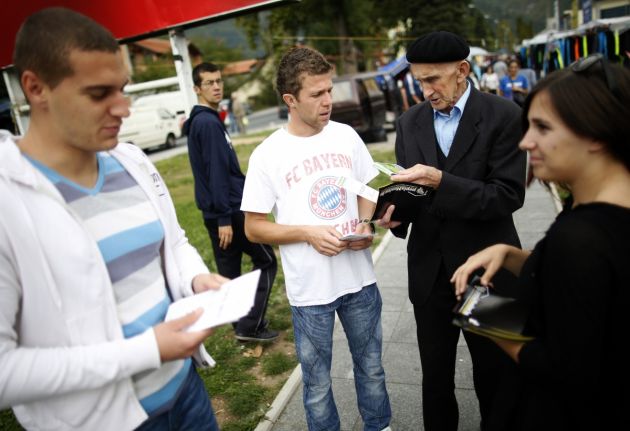In first census since its war, Bosnia's 'Others' threaten ethnic order

SARAJEVO (Reuters) - Darko Brkan wants to upend Bosnia's constitutional order, and he's going to use the country's first census as an independent state to do it.
The 15-day population count begins on Tuesday, a milestone in Bosnia's recovery from a 1992-95 war but one that is stirring tensions that stifle development and threaten its future.
Brkan, 34, is behind a campaign calling on Bosnians to reject the ethnic and religious labels that dominate discourse and divide Bosnia more than two decades since it split from Yugoslavia and descended into war.
Thousands have joined, posting pictures of themselves on the Internet holding signs that read "Ethnically challenged", "Constitutionally challenged" and "A citizen above all".
The census goes to the heart of how Bosnia sees itself today - as a country united and at peace or a collection of ethnicities each vying for the upper hand.
More than an essential tool of economic planning, the count could have ramifications for the delicate system of power-sharing set in place by a 1995 U.S.-brokered peace deal.
That deal defined the warring sides - Serbs, Croats and Bosniaks (Muslims) - as 'constituent peoples', splitting territory and power between them at the expense of everyone else - Jews, Roma or the children of mixed marriages who refused to pick a side and are excluded from public sector job quotas.
Loosely defined as 'Others', they reject the labels fed upon by political parties established along ethnic lines.
"The constituent peoples jointly share a set of political rights that exclude those who are not members of these groups, and they want to protect it," Brkan said. "I don't feel an ethnic affiliation as part of my identity, nor do I state it."
The last census was in 1991, on the eve of Yugoslavia's fall, when 43.5 percent of Bosnia's then 4.4 million people declared themselves Muslims, 31.2 percent Serbs and 17.4 percent Croats. Over five percent said they were 'Yugoslav'.
In the war that followed, 100,000 people were killed, the vast majority of them Muslims. Two million were displaced.
ETHNIC QUOTAS, POLITICAL PATRONAGE
Resembling an election more than a census, Serb, Croat and Muslim political and religious leaders are urging their constituents and congregations to declare their ethnicity and faith as a matter of national duty.
They each fear being weakened in the system of ethnic quotas set down under the 1995 accord, a Byzantine form of government that stopped the war but stifled development. Bosnia trails its ex-Yugoslav peers in the quest to join the European Union.
The European Court of Human Rights has ruled the constitution discriminatory, but leaders have failed to agree on how to amend it, blocking Bosnia's application to join the EU.
"If there are more than 50 percent of us, Bosnia will be a national state of Bosniaks and we will dominate the other two peoples," said Sejfudin Tokic, leader of a campaign urging Muslims to declare themselves Bosniaks and their religion Islam.
In a letter to clergy, the Roman Catholic archbishop in Bosnia, Cardinal Vinko Puljic, said it was the "moral duty" of all Catholics to declare themselves as such in the census.
Sociology professor Slavo Kukic said the census was in danger of being hijacked.
"Instead of recording the biological potential of Bosnia, the census will in effect become a factor of ethnic homogenisation and reactivate tensions that we should have expected to weaken," he told Reuters.
Brkan and the 'Others' represent a threat to the status quo, which feeds a bloated public sector and the culture of political patronage that flows from it. He says 20 percent of Bosnians consider themselves 'Others', a figure impossible to verify until the results of the census are announced in mid-January.
But the campaign has already angered nationalists.
"The reaction reveals their fear that the model they've been advocating for the past 25 years could fall apart," said Osvit Seferovic, leader of the 'Citizens Front - the Others' in the ethnically-divided town of Mostar.
"The more 'Others', the more normal Bosnia and Herzegovina will be," he said. "In the census, it's important to be anything but a Bosniak, Croat or Serb. It's important to be normal."
(Writing by Matt Robinson; editing by Ralph Boulton)
